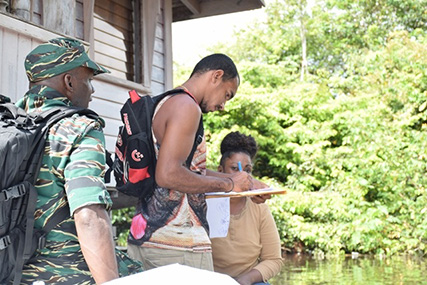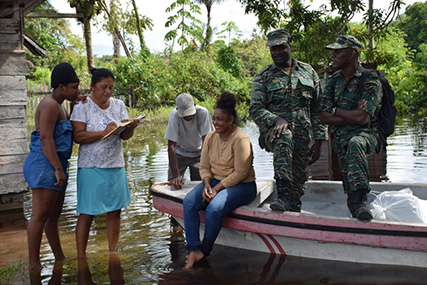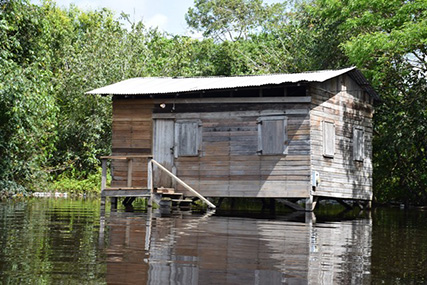Though most of the residents’ yards and the land in Kwakwani, Region 10 are still inundated, the water level has significantly reduced, head of the community’s Neighbourhood Democratic Council (NDC) Jaunita Leacock says.
Speaking to Stabroek News yesterday, Leacock explained that they were able to have “two full days of sun and another two days with sun and a little rain” which has resulted in the water level decreasing significantly.
However, she said that there are certain parts of the area where the road is still covered by water but it is at a height where persons can wade through and do not have to use their boats.
“It is still on the road but instead of boats people are able to walk through to get to the main part in Kwakwani as some parts are knee height and walkable,” she stated.
However, she noted that Lamp Island, the area that was most affected by the flood, is still heavily covered and residents still have to use their boats to traverse the area.
“Over the river [another section of Kwakwani] is still flooded but there has been no outbreaks of diseases and the residents are adjusting fairly well. The situation is getting better,” she said.
On July 14, the water level rose several feet due to the heavy persistent rainfall and as a result, over 300 residents were affected with more than 70 of them feeling the brunt of the flood.
The Civil Defence Commission (CDC) and the Region Ten administration are currently monitoring the flooding in the Berbice River village. CDC Director General Lt. Col. Kester Craig and his team, along with representatives from the Ministry of Public Health, Ministry of Agriculture and the Hydrometerological Office visited the area and did an assessment of the situation.
“We went to do a quick assessment of the situation and to work with the sub-district of Kwakwani to ensure that they have the relevant response mechanisms in place. The water is high at Water Front and Lamp Island,” Craig had explained.
He noted that since the majority of persons built their homes on stilts, as flooding in the area is a recurring problem, only a small number of persons would have had floodwater invading their homes, and many of those persons have since temporarily relocated.
“A few persons would’ve moved and persons are already taking measures. They are using bleach in their water and some are using the same rainwater. They are taking adaptive measures to cope with the situation,” he had said.
The area has been prone to flooding over the years and Leacock had explained that the residents have been calling for the Berbice River to be dredged, which they are convinced is the cause of their current plight.
She had said the residents have related that while the flooding would occur every few years, the frequency has increased and they are blaming this on the failure by authorities to act on calls to dredge the river.
Meanwhile, the Department of Public Information (DPI) said on Saturday that the distribution of food supplies to the Kwakwani homes affected by flooding continued on Friday. This follows the initial damage assessment and verification conducted by the regional administration and the NDC.
DPI said that the team distributed food items along the Waterfront area to approximately 50 homes. Many residents would have received supplies during the first distribution stage. More homes were to be completed on Saturday.
“The Civil Defence Commission recognised the needs of the residents of Kwakwani and provided supplies. These items are going to be used for persons who are directly impacted, to bring some amount of relief to them. It’s very difficult being in a situation where the water level is 5-7 ft high and trying to get food,” the Director-General said.
Craig told DPI that the distribution is transparent, ensuring accountability. Prior to delivery, the Regional Democratic Council of Region 10 and the NDC visited the affected homes to document relevant contact information. Recipients were required to sign the distribution sheet thereby ensuring an efficient process when persons collected items.









